Bathroom renovation costs in New Zealand: A full breakdown
Written by
20 July 2020
•
19 min read
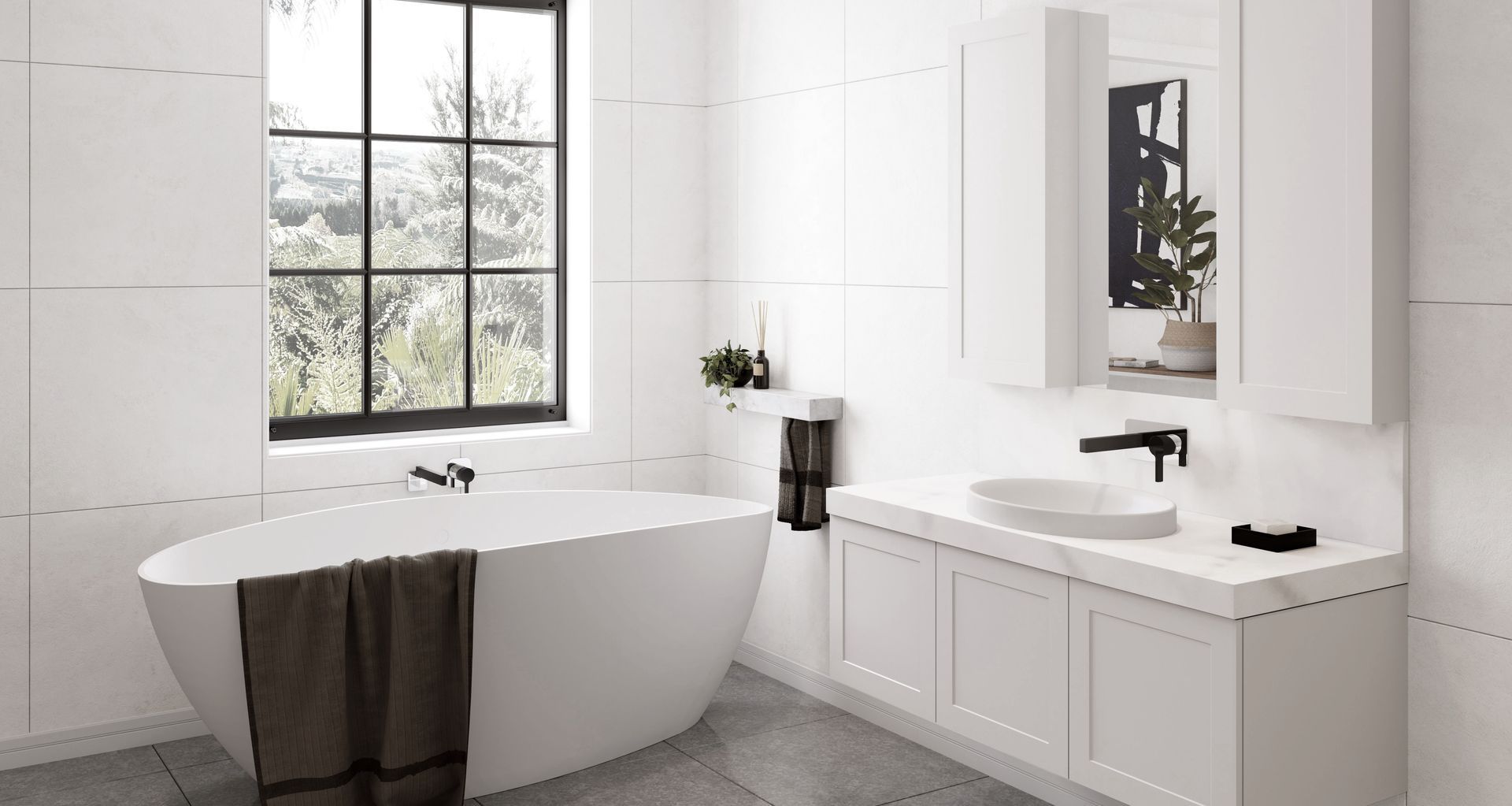
If you’re considering a partial or major bathroom renovation, it’s important to understand the fundamentals and the likely costs of different design decisions. There is an endless number of choices you can make which makes the renovation process all the more challenging. By doing your research and having a planned approach, you can set your budget accurately and get more for your money.

The average cost of a bathroom renovation in New Zealand
The average cost of a bathroom renovation in New Zealand is somewhere between $10,000 - $20,000 though there is a wide range of work that gets done from $5,000 - $50,000+.
Typically speaking, bathroom renovations can be categorised into the following scales of projects:
Bathroom renovation costs in New Zealand:
- Cosmetic renovation of an existing bathroom: $5,000
- Basic bathroom renovation (including new fixtures): $10,000 - $20,000
- Mid-range bathroom renovation (including new fixtures): $30,000
- Luxury bathroom renovation (including new fixtures): $50,000+
DIY bathroom design tip: If you have an existing bathroom that needs a bit of an upgrade, consider repainting, upgrading cabinetry handles, blinds or window coverings and installing modern lighting. These simple touches don’t require consent and most can be done yourself and can make a huge difference to the space without breaking the bank.

Factors that influence the overall budget of a bathroom renovation
There are many things that impact the overall budget of a bathroom renovation, some more so than others. Understanding these from the outset allows you to quickly get a gauge of what your total renovation cost might be.
The size of your bathroom
The size of a bathroom can have a bearing on your costs for the basic fact that there is more space to furnish. The average size of a family bathroom in New Zealand is around 2.5m x 3.0m so anything above this means you'll incur more costs to cover this additional space, especially when it comes to things like tiling. A bigger bathroom often means larger and more lavish fixtures and furnishings, which are typically more expensive too.
Previous purpose of the existing space
Another key aspect that will change the cost significantly is if you’re creating a new bathroom in a room of the house that was previously used for other purposes. If this is the case, you will need to install a window or ventilation in the new space and you'll also need to factor in plumbing or waterproofing costs.
If the room in question was already a bathroom and you’re redesigning it, then there'll be demolition and removal costs that include the removal of old shower enclosures, toilets, tiles etc that will need to be factored into the overall bathroom renovation cost.

Choice of materials
Simple material choices can make a significant difference to the budget of a bathroom renovation project. For example, an acrylic tub will generally be more affordable than a cast iron one while options like marble countertops (which are undeniably stunning) will inflate your budget considerably.
When it comes to materials, it does pay to take a long-term view when considering their value. While it is tempting to take the most cost-effective option at every opportunity, if a low-quality option needs replacing after a few years, then the return on investment on a higher-quality choice will probably be better in the long run.
Labour
You’ll also need to factor in labour costs. The tradespeople and designers usually involved in a bathroom renovation include the following:
You'll also find bathroom renovation companies that take care of everything using their own team or contracting out to professionals in their network. If you are going to go with a bathroom renovation company, you may wish to confirm who will be doing the actual work on the job.
Depending on the complexity of the work at hand, you may wish to DIY some of these jobs, especially if you're on a budget. For specialist trades such as waterproofers, electricians and plumbers there are various regulations around work that must be undertaken by a certified professional, so it’s important to understand what the requirements are and what types of work need a building consent.
Find all the best building and renovation professionals in New Zealand on ArchiPro
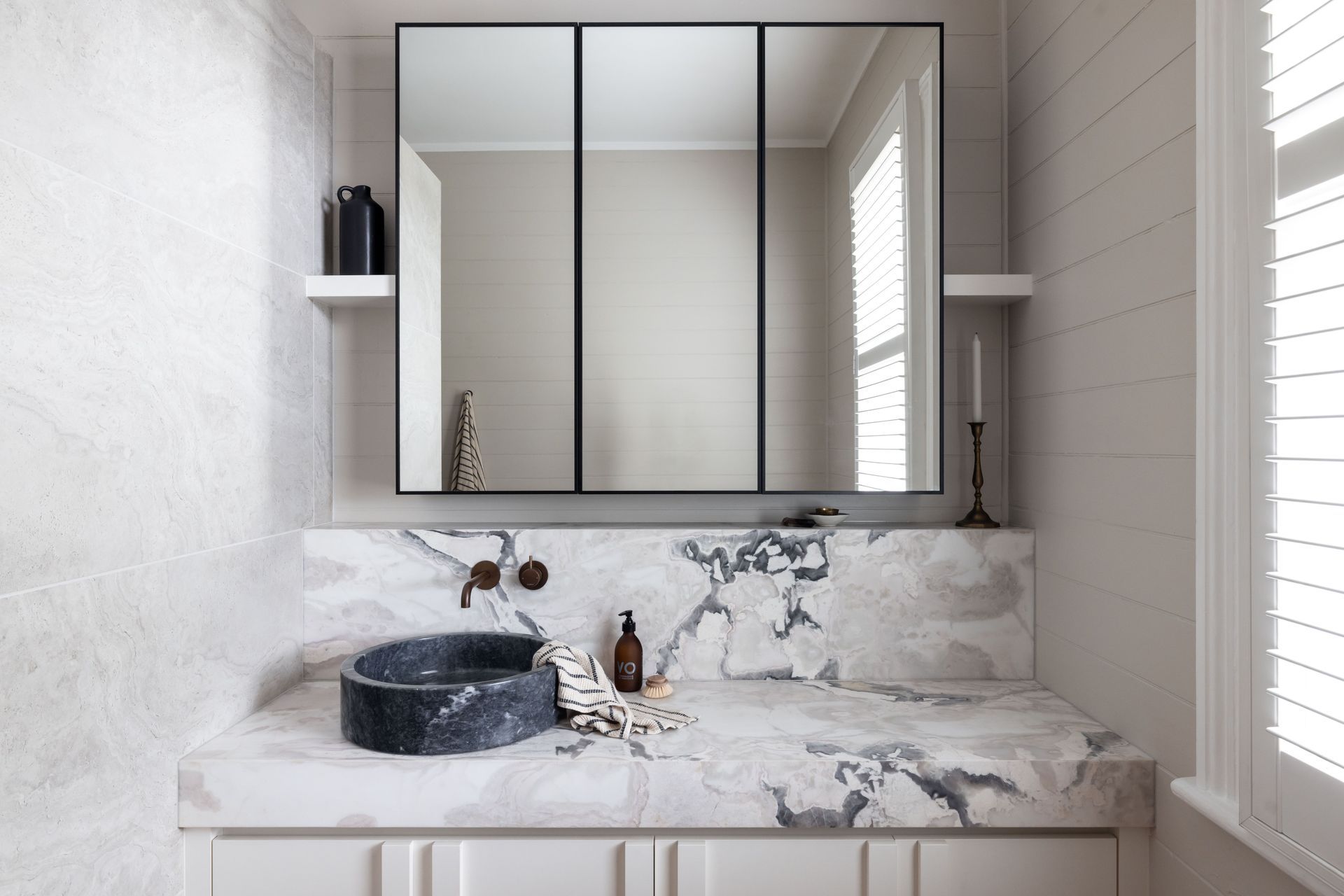
A detailed breakdown of bathroom renovations costs
When planning your budget for a bathroom project, be it a modest makeover or a luxury bathroom renovation, it's helpful to be able to break it down by specific areas of the bathroom. It allows you to work your way through the renovation process, comparing each area with one another, and prioritising exactly where you want your money to go.
1. Bathroom tiles
As a rough guide for the cost of tiling, including adhesive, grout and labour is anywhere from $200 per square metre to around $500 per square metre.
As you can see, tiling cost per square metre can vary significantly – but there are some easy ways to keep the costs in check. Glass, ceramic and porcelain tiles are popular choices for the bathroom, while vinyl tiles are a low-cost option that can provide a striking finish.
Extending the bathroom floor tiling up the wall will increase the associated costs but brings benefits worth considering such as the illusion of more space, water resistance and ease of maintenance.
Budget tiling tip: To keep costs down, consider creating a feature strip of wall tiles rather than tiling the entire space.
Related article: Stunning bathroom tile ideas from beautiful homes in New Zealand
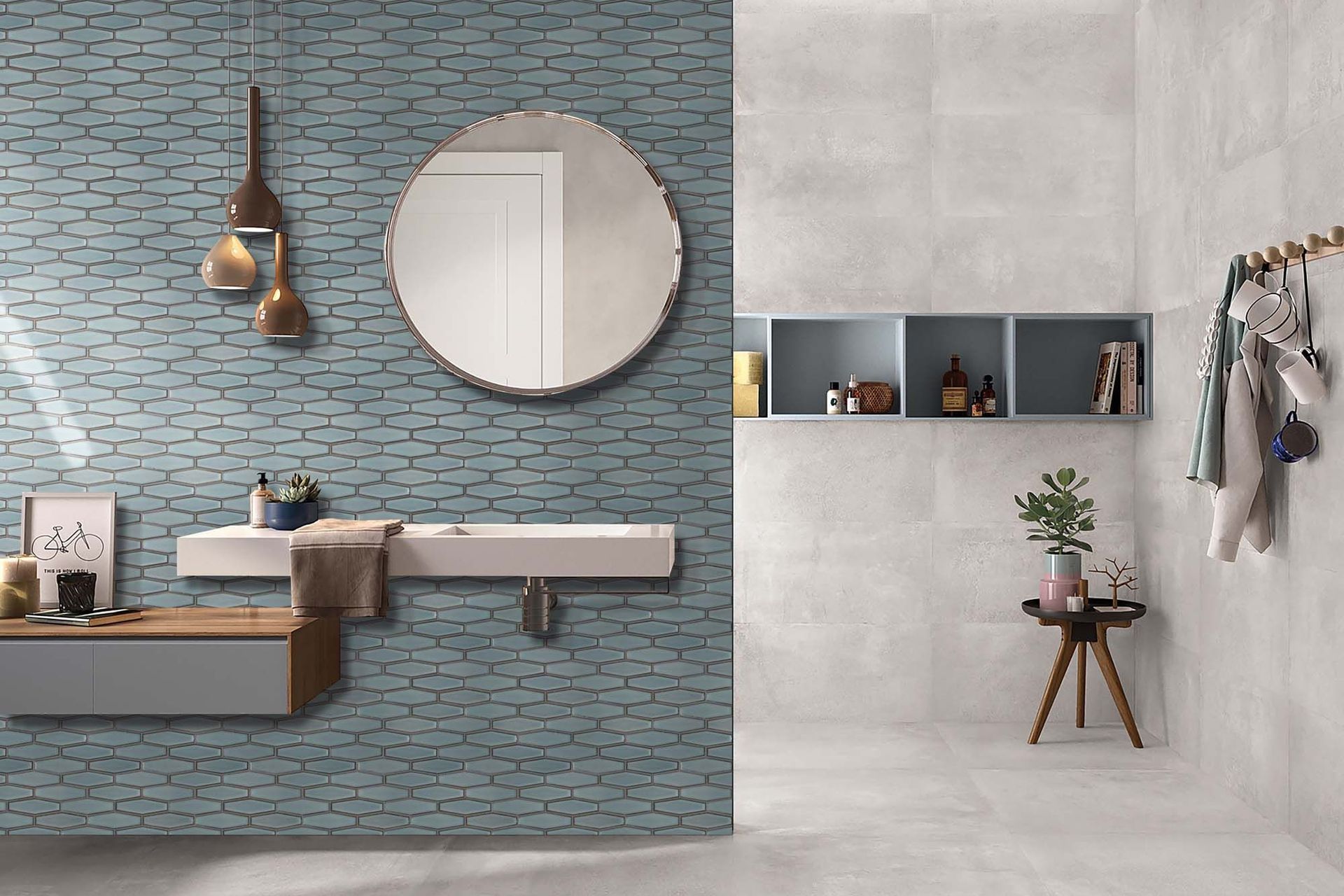
How much do tilers charge in New Zealand?
A tiler will charge anywhere between $45 - $150 per hour depending on their experience which ranges from apprentices to seasoned professionals. Tiling is a precise activity that requires a high degree of skill and is one area you don’t want to scrimp on at the expense of quality. Be sure to check references before engaging a tiler and ask for photos or a portfolio of recently completed projects if possible. Conveniently, these are available online for all the tilers on ArchiPro.
What are the benefits of bathroom tiles?
Tiles are a popular option for bathroom renovations for many reasons including their durability, strength and lack of required maintenance over time. However, it is their ultimate versatility and range of aesthetic styles where tiles often excel above the rest. Anything from concrete tiles to faux timber tiles can be found with different shapes and sizes to consider as well. You could opt for an uber-contemporary large-format tile right or a decorative mosaic tile which can create a striking impact as a feature wall. Stylistically, the options are endless and you can express some genuine creativity with them.
Tile design tip: Create a bathroom of timeless appeal with encaustic tiles (also commonly known as Moroccan tiles). To save on cost, choose a feature area for the encaustic tiles and surround it with a more pared-back tile or floor covering.
2. Showers
How much does it cost to install a shower?
A shower installation will cost anywhere from around $1,000 - $8,000 depending on the size, materials and desired features. The standard shower size in New Zealand is 900mm x 900mm and you'll find a good number of shower enclosures of this size which will fairly easily slot into a space.
However, if you are creating a tiled shower, this will increase the total cost of installation compared to a standard acrylic or PVC shower.
How much does it cost to tile your shower?
Depending on the choice of tile and the size of the shower, a tiled shower will set you back between $2,000 - $5,000 with vinyl, ceramic and porcelain tiles at the lower end and stone tiles at the upper range of costs. By contrast, an acrylic shower will cost between $1,000 - $3,000, but offer less latitude for customisation.
A breakdown of approximate shower installation costs (including materials and labour):
- Acrylic shower box: $1,000 - $3,000
- Tiled shower: $2,000 - $5,000
- Glass shower door: $800 - $2,500
- Shower trays and drains: $200 - $900
- New plumbing: $1,000 - $3,000
- Shower heads and slides: $100 - $800
- Shower mixers: $100 - $500
Discover an extensive range of designer shower products on ArchiPro
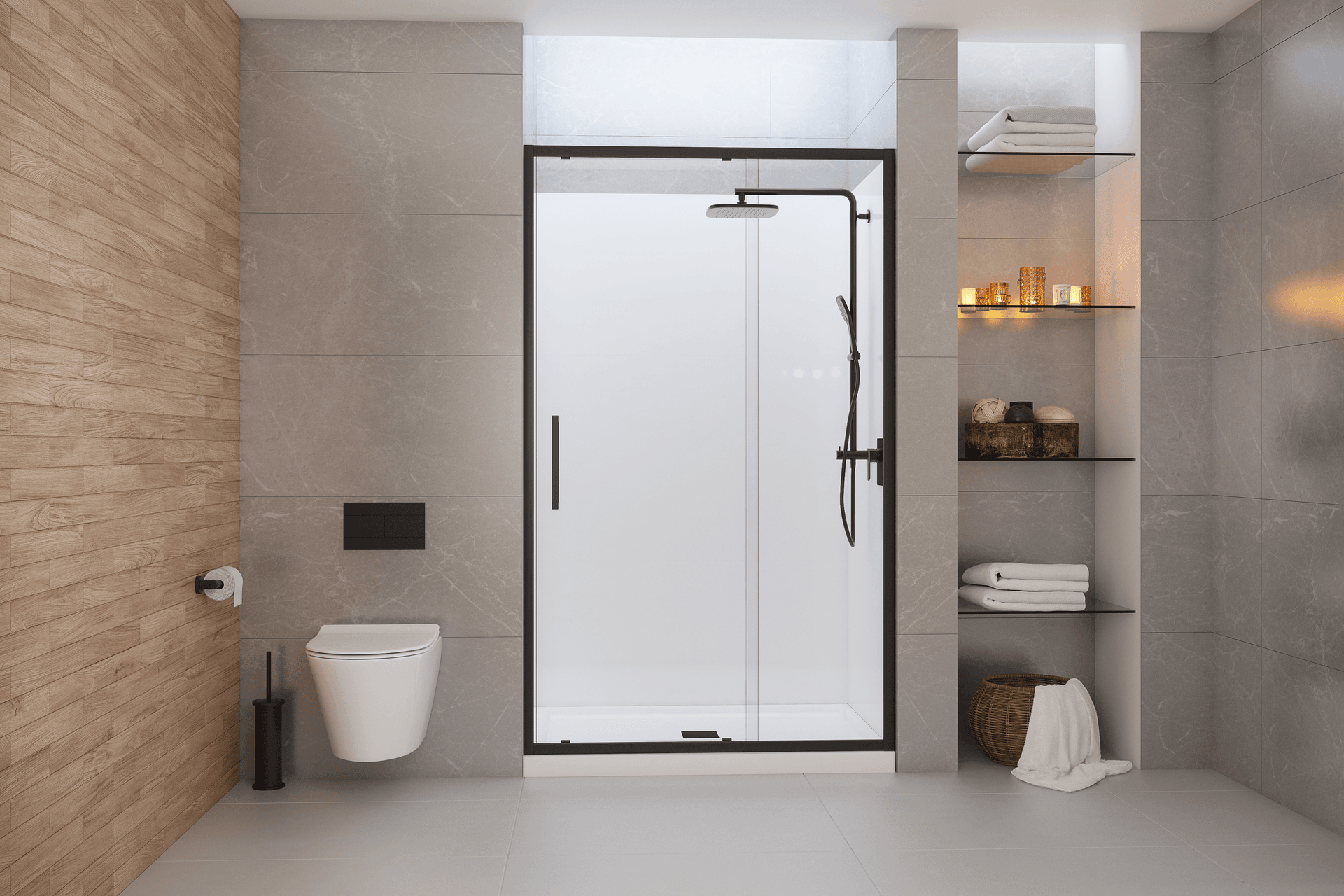
3. Bathtubs
How much does it cost to replace a bathtub?
A basic built-in acrylic bathtub can cost as little as $300 while at the other end of the spectrum, a cast-iron freestanding bathtub can cost anywhere between $3,500 - $10,000+. In addition to this, you'll need to pay for the cost of labour which can typically be between $70 - $150 per hour. Labour will include the removal of any existing bathtub (if applicable) as well as the installation of a new one.
Approximate cost of bathtubs (excluding installation labour):
- Bathtub taps and mixers: $100 - $500
- Built-in acrylic bath: $300 - $2,500
- Built-in spa bath with jets from $2,500 - $7,000+
- Bath/shower set with door: $1,500 - $3,500
- Back to wall bath: $1,000 - $5,000
- Freestanding bath: $1,000 - $10,000+
Find the perfect bathtub for your bathroom renovation on ArchiPro

What is the difference between a built-in bath and a freestanding bath?
A freestanding bath is one that is positioned away from the walls in its own space whereas a built-in bath is typically installed into a frame or an existing alcove.
Designer freestanding baths can double as an eye-catching statement piece, enhancing the entire bathroom design and reflecting the character of your home. They are ideal for large bathrooms and offer far more options in terms of size and shape in comparison to built-in baths, however, as you have seen they’re generally the more costly option as well.
A standard built-in bath can cost as little as a few hundred dollars so it pays to consider the overall aim of the bathroom design and where the budget should be best allocated to maximise the use and enjoyment of the space.
Budget tips for choosing a bath: Consider the space as a whole. How often would you use a bath? Are you likely to use it more or less frequently over time? For example, do you want a bath to relax in at the end of the day or is it for children who will likely use it less over time? If you’re clear about why you’re incorporating a bath in your bathroom design, it is easier to allocate the right amount of budget to it. If you’re likely to use the bath only once in a while, it’s probably not worth splashing out on a high-end designer bath and instead opting for a basic version. However, if you’re aiming to create a spa-like haven then allocating more of the budget to a designer bath will likely pay off.
Related article: Different types of bathtubs - pros and cons
4. Toilets
How much does a toilet cost?
Like other bathroom elements, toilets range greatly in price depending on the style, finish and features. A basic toilet will cost around $200, excluding installation, while a high-spec toilet with custom features, smart technology, lighting and washing or bidet features can cost up to $6,000 excluding installation.
A plumber is generally required to install a new toilet correctly and will be required if new plumbing is needed, or you’re looking to change the layout of an existing bathroom. Bear in mind that changing the layout of an existing bathroom is likely to escalate costs significantly so if you’re on a budget, consider working with the existing bathroom layout where possible.
Labour costs for installing a toilet start from around $70 per hour.
Toilet design tip: To reduce the cost of upgrading a toilet, check the type and placement of water inlets and make sure the new model you choose will integrate easily with the current plumbing. For small bathrooms, consider wall hung toilets as the cistern is typically concealed in the wall cavity saving much-needed space.
Related article: How to choose a toilet: complete guide
Approximate cost of toilets (excluding installation labour):
- Close coupled toilet: $200 - $800
- Back to wall toilet: $300 - $1,500
- Wall hung toilet: $500 - $3,000
- Smart toilet: $1,500 - $6,000
Browse an extensive range of high-quality toilets on ArchiPro
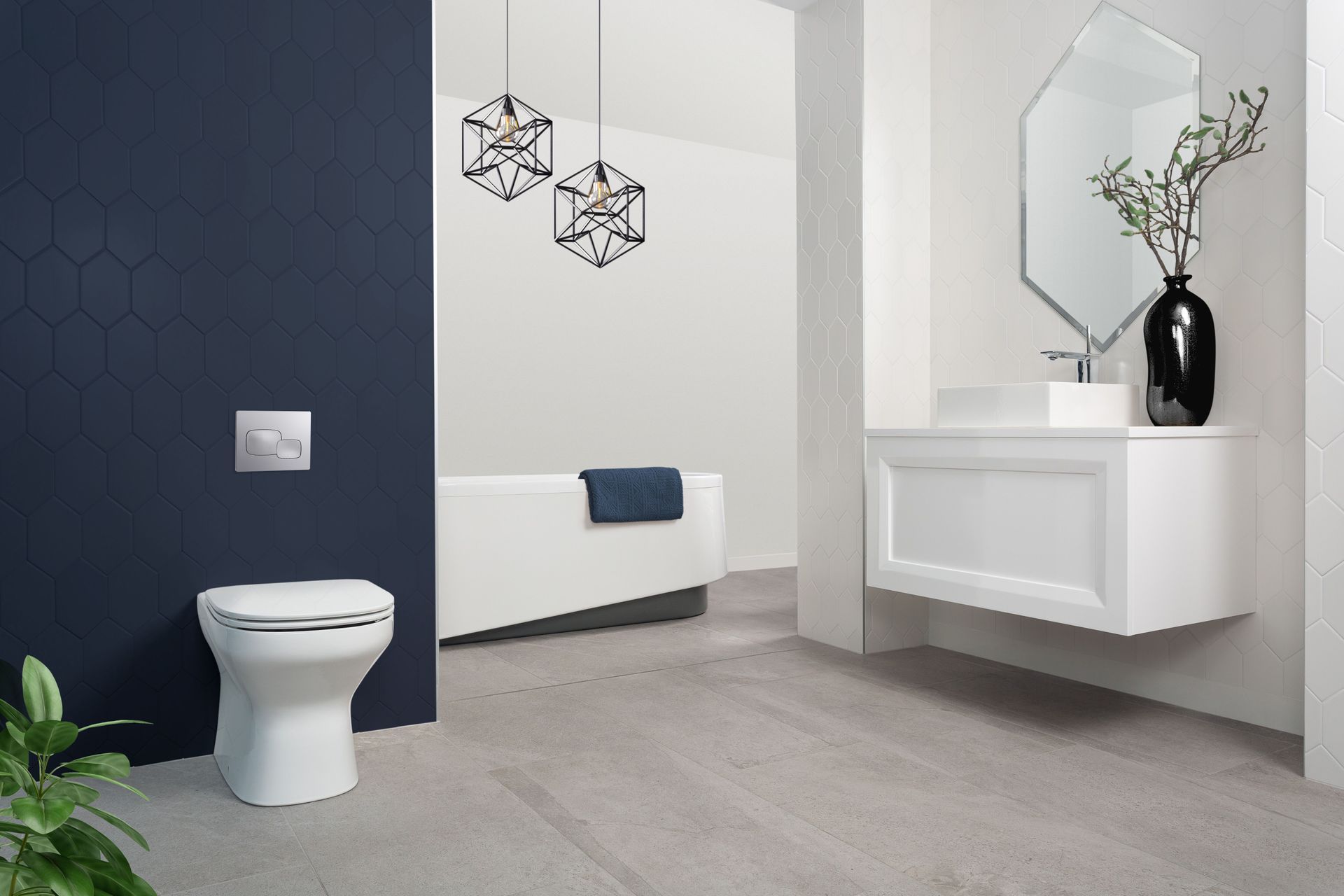
5. Bathroom vanities
What is the cost to replace a bathroom vanity and sink?
A bathroom vanity can cost anywhere from $500 - $3,000. As one of the more prominent features in the bathroom, choosing the perfect vanity is vital to establishing and emphasising the overarching theme. The options in terms of size, style and materials are endless with a wide range of vanity prices to suit any budget.
Bathroom vanity costs in New Zealand:
- Single, basic bathroom vanity: $500+
- Basic double bathroom vanity: $1,500+
- Bespoke/high-end bathroom vanity $3,000+
Explore a huge range of premium bathroom vanities on ArchiPro
How to choose a bathroom vanity
When choosing a vanity, consider the space and storage requirements, the height of the users, and whether a single or double basin is desirable. In terms of design, there are countless options available including custom built vanities, so it pays to spend time in the early stages of your bathroom design considering the feature pieces in your bathroom.
If one of those is a vanity, discussing the style, size, finish and colour that appeals to you with your bathroom designer is a great way to ensure you’re making the right choice. For smaller spaces, a wall hung vanity can make the room feel more spacious, while freestanding vanities can be better suited to larger bathrooms.
Budget tips for choosing a vanity: The easiest way to keep costs down when selecting a vanity is to opt for a smaller piece and select a basic flat wall mirror to complement it. Mirrored cabinets offer the next level up in terms of price, but a basic vanity itself excluding a mirror generally starts at around $1,500. If you’re looking for a high-end vanity, the options are diverse. For example, a bespoke vanity is made specifically for your space and can incorporate lighting, recessed shelving or floating drawers.
Related article: 23 bathroom vanity ideas to refresh your space

6. Bathroom taps
How much does it cost to replace bathroom taps?
If you’re on a budget, a simple bathroom mixer can be purchased for as little as under $50, but at the other end of the scale, you'll find luxury bathroom taps up to $1,000.
Bathroom tapware costs in New Zealand:
- Basic basin mixer/taps: $50 - $250
- Mid-range basin tapware: $250 - $400
- Luxury designer tapware: $400 - $1,000
How do you choose bathroom taps?
Well-designed bathroom tapware has an innate beauty, whether it's sculptural or minimalist, bold or detailed. When choosing tapware there are almost limitless choices in terms of size, finish, function and colour. However, tapware can be costly, so it’s worth considering what portion of the bathroom budget you’re happy to allocate to it from the outset to narrow down the options.
If statement tapware is the aim, creativity can reign supreme. Perhaps it’s a brass floor-mounted bath filler, striking bold taps in a bright, overtly contemporary colour, or a brushed gold angular mixer set, the choices are vast.
In many cases, it pays to select tapware in conjunction with showerheads and mixers to create a synergy of design across the bathroom. Selecting different pieces from different suppliers can work in some situations, but it is often the case that even when the same basic colour or finish is chosen, the products can be vastly different when put in close proximity to one another due to different styles of manufacturing or pigments used.
Tapware design tip: Consider the types of tapware used in the rest of the house. Do you want to create a theme between rooms or create a statement in the bathroom? If you’re making a statement with tapware, get as creative as you like with colour, finish and style and consider making the tapware the centrepiece of the bathroom, but remember to choose it first if this is the aim so the other pieces will work well in conjunction with it.

7. Bathroom flooring
What does bathroom flooring cost and what are the best options?
Flooring can cost anywhere from $30 per square metre for options like lino to in excess of $100 per square metre for hardwood timber.
Floor tiles, mentioned earlier, remain one of the most popular choices for bathroom flooring due to their durability and flexibility in terms of colour, style and finish. They’re easy to maintain and require little maintenance, however, it’s vital they are correctly installed with appropriate waterproofing and grouting. The intricate nature of tile installation can inflate the cost of this option compared to the likes of vinyl and laminate.
Related article: A guide to selecting the right sized tiles for your floors
Bathroom flooring costs per square metre (excluding installation)
- Lino flooring: $30+ per square metre
- Vinyl flooring: $30+ per square metre
- Laminate flooring: $50+ per square metre
- Ceramic tiles: $70+ per square metre
- Hardwood timber: $120+ per square metre
Flooring design tip: If you’re considering underfloor heating, make sure the flooring you choose is compatible with the type of system you prefer. If you’re renovating and already have a tiled floor, it can be expensive to remove tiles so it may be that other types of heating for the bathroom will be the most cost-efficient such as a vented central heating system or radiators.
Browse some of the best flooring options in New Zealand on ArchiPro
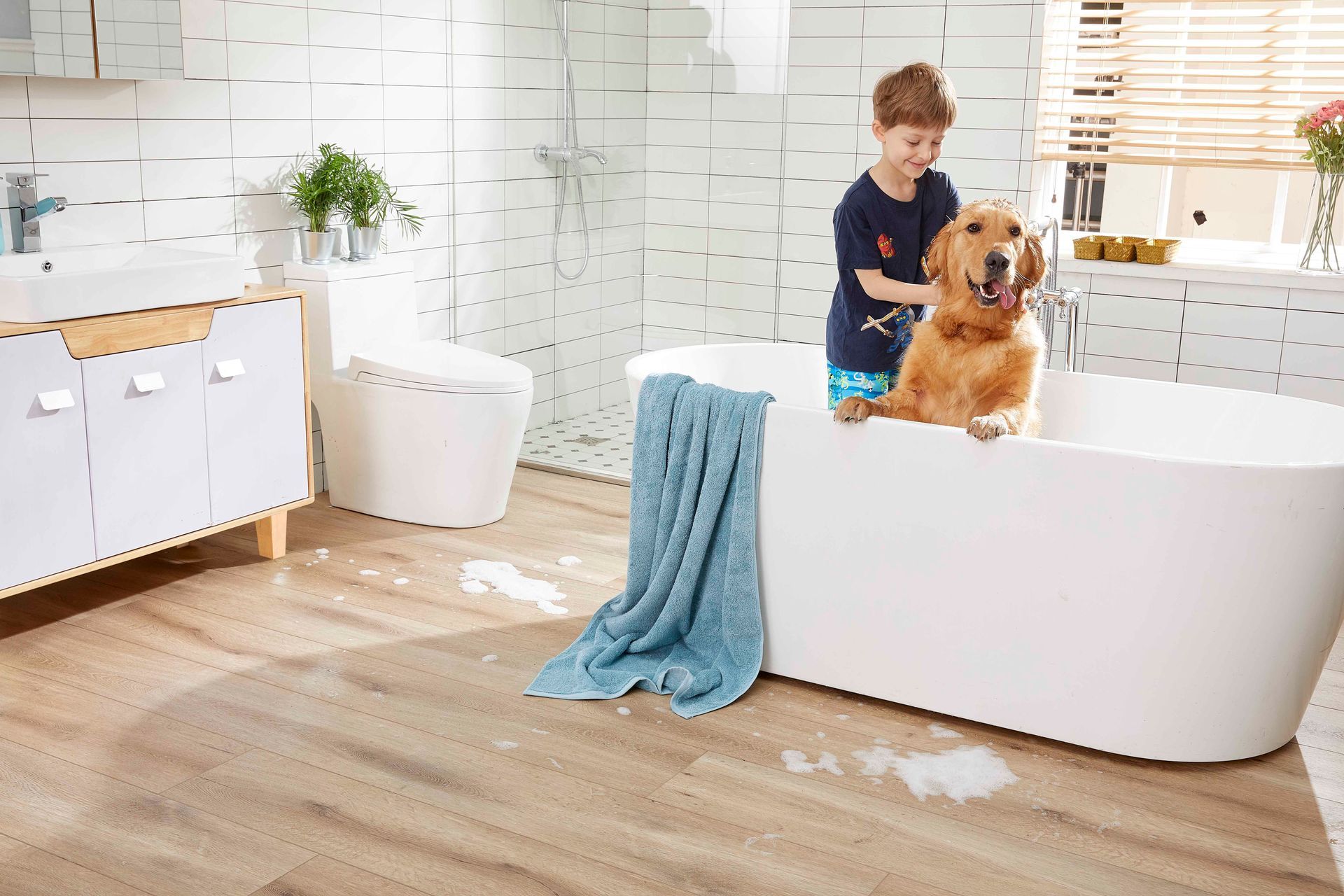
8. Bathroom mirrors
What does a bathroom mirror cost?
Bathroom mirrors vary greatly in price, ranging from $100 - $1,000+ for options with demisters and lights.
However, the cost of a mirror for the bathroom will depend on various factors, most notably size. Other key factors that influence the price of mirrors include whether or not heating, lighting or cabinetry is integrated (all of which will be generally more expensive than a flat mirror). The type of glass specified, whether it is a framed or frameless mirror, and any bespoke elements will also impact the pricing.
Approximate cost of bathroom mirrors in New Zealand, excluding installation:
- Basic wall-hung mirror (standard size and specifications): $100 - $300
- Mid-range mirror: $400 - $700
- High-end mirror: $800 - $1,000+
What is the best type of mirror for a bathroom?
Mirrors, while very functional pieces of bathroom decor, are also important when it comes to creating a sense of space, openness or reflecting light. As such, they often become a central design element, specified in conjunction with lighting and bathroom cabinetry.
More often than not, LED backlit mirrors are the option of choice when it comes to achieving ideal lighting. A backlit bathroom mirror ensures a consistent, even light - something that’s important when using a mirror for applying makeup, shaving or hair styling.
Design tip: Framed mirrors can make for a stunning feature in the bathroom, but before purchasing, make sure the frame is moisture-resistant.
9. Bathroom lighting
How much do bathroom lights cost?
The cost for bathroom lighting can vary widely and can range from $10 for simple LED downlights to well over $1,500 for a statement pendant light. The type of light fixture you decide upon is the biggest factor that will influence the cost beyond that of the designer and brand.
The cost of labour for an electrician to install a bathroom light can range from $70 - $150 per hour. While some lighting installations can be fairly simple, especially when using pre-existing fixtures, others can be more time-consuming. Wall or vanity lights, for example, may require additional wiring while a large pendant light may require a brace for structural support.
Related article: Pendant lights - What are they and how to use them best
Approximate cost of light fixtures (excluding installation labour):
- Basic LED downlights: $10 - $30
- Ceiling flush mount light: $50 - $300
- Ceiling track light: $100 - $350
- Wall light: $150 - $1,500+
- Ceiling pendant light: $100 - $1,500+
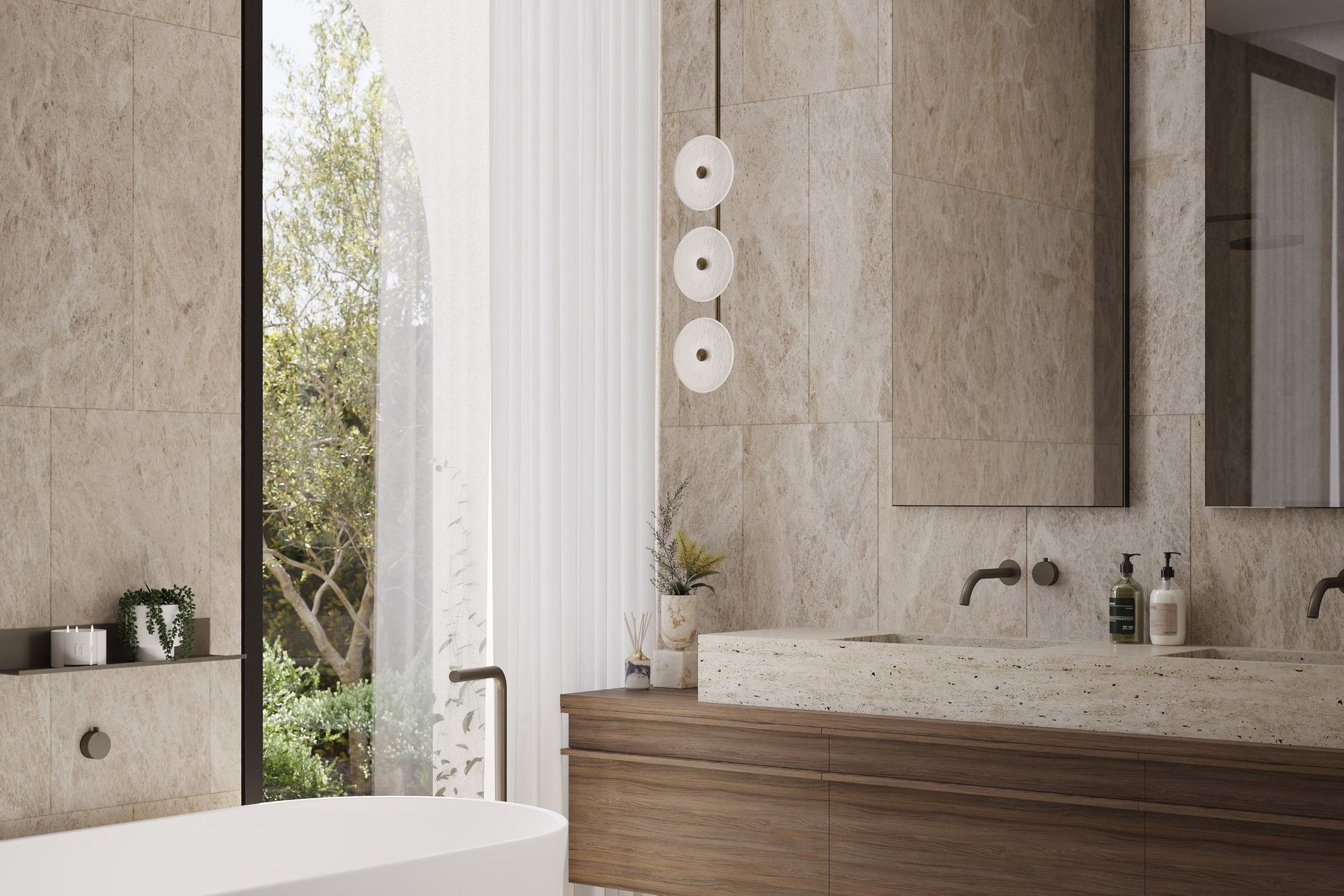
10. Bathroom cabinets and storage
What do bathroom cabinets cost?
Bathroom cabinets and storage solutions can cost anywhere from $300 - $2,000+ in total depending on a range of factors including size, material, design and brand.
The most cost-effective tend to include materials such as melamine or laminate and are typically ready-to-assemble stock cabinets. These are often more functional than aesthetic but are usually reliable enough to get the job done.
Custom bathroom cabinets are often made of higher-quality materials such as solid wood or engineered wood are almost always more expensive. They allow you to customise your storage space exactly how you want it in terms of size, design, finishes and more.
These bespoke models may require professional installation which is often done by the cabinet supplier or their associated contractor. These costs will again vary due to the complexities involved so it's always best to confirm at the time.
Discover a great range of bathroom cabinets to meet all your bathroom storage needs
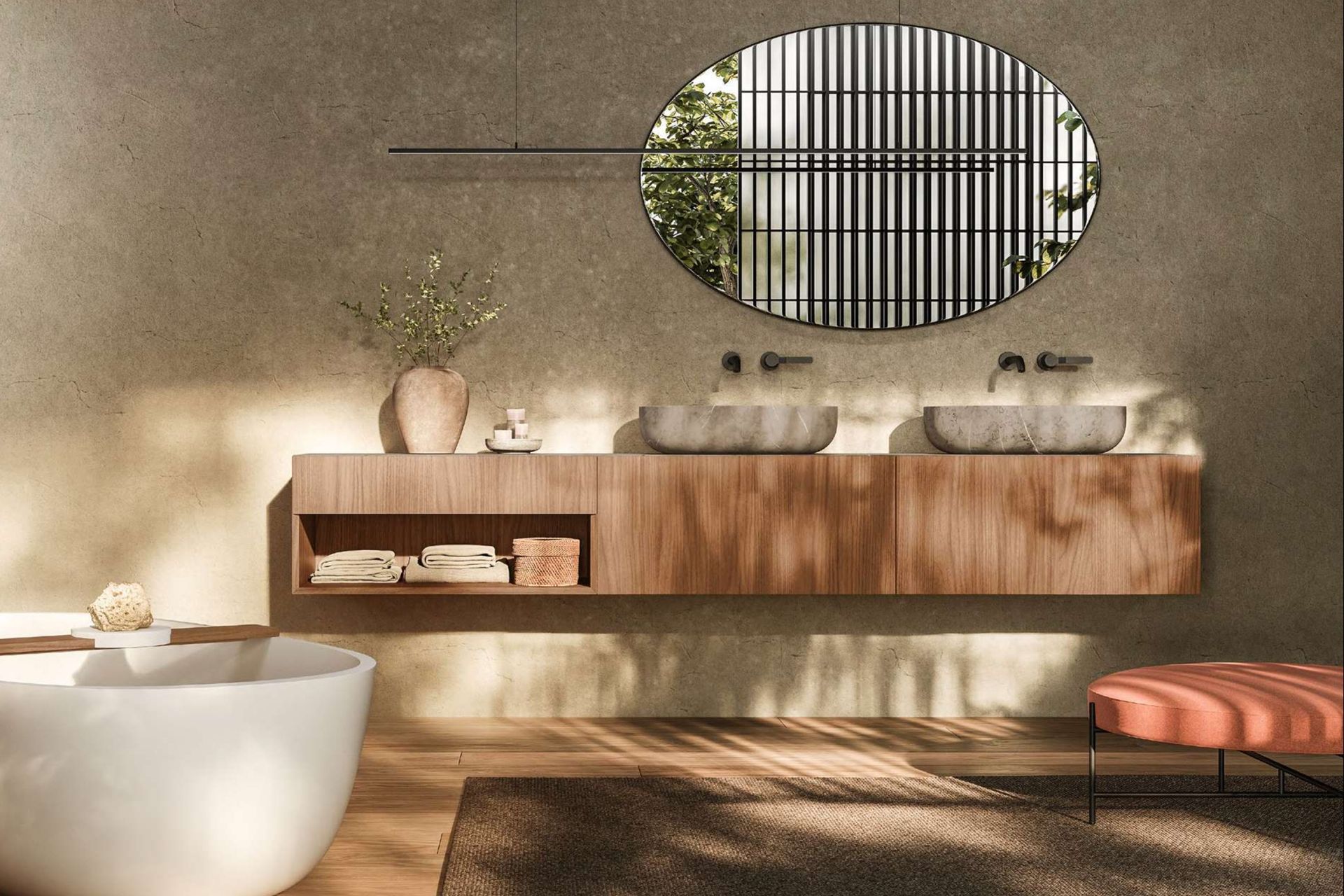
11. Bathroom heating and ventilation
What are the different options for bathroom heating?
The main options for heating a bathroom are bathroom heaters and extractor fans (which also feature lights and heaters). Heated towel rails are also popular, offering another source of heat to help keep a bathroom warm.
Another increasingly popular option, especially for luxury bathroom renovations, is underfloor heating. It's a feature that takes bathroom comfort to the next level, especially for those who live in regions that get particularly cold in the winter. Underfloor heating can eliminate that sharp, cold feeling underfoot which you can experience during colder seasons.
How much does bathroom heating cost?
A basic wall mounted radiant bathroom heater or fan heater can be purchased for around $100 - $500. 3-in-1 extractor fans usually start from around $150 - $500. Basic heated towel rails can be found for $200 but can rise in price to $1,000 depending on size and features.
The cost of underfloor heating is dependant on a number of factors including the type of system and the size of your bathroom. An electric system costs about $90 per square metre compared to a hydronic (water-based) system which costs $175 per square metre.
Bathroom extractor fans can cost between $400 - $1,000 to install depending on the complexity of the work involved.
Related article: Bathroom heating options and how much they cost to run

Everything you need to know about bathroom renovation costs in New Zealand
As you can see, there is quite a bit involved to ensure you cover every bathroom renovation cost associated with a project. Whether you're simply considering a quick refresh for a small bathroom, a standard bathroom renovation for a family home or a luxury remodel for your forever home, this guide provides you with a great blueprint to get the process started smoothly. By following it closely, you'll be able to get exactly what you want out of your new bathroom and enjoy it for years to come.
Related article: 17 modern bathroom ideas from stunning New Zealand homes
(This article was updated on the 15th November 2024)

